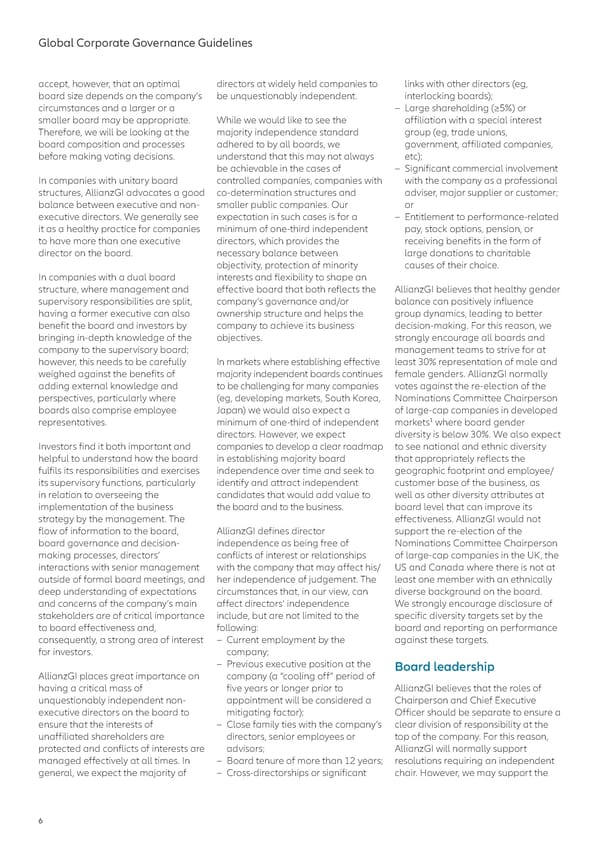accept, however, that an optimal board size depends on the company’s circumstances and a larger or a smaller board may be appropriate. Therefore, we will be looking at the board composition and processes before making voting decisions. In companies with unitary board structures, AllianzGI advocates a good balance between executive and non- executive directors. We generally see it as a healthy practice for companies to have more than one executive director on the board. In companies with a dual board structure, where management and supervisory responsibilities are split, having a former executive can also benefit the board and investors by bringing in-depth knowledge of the company to the supervisory board; however, this needs to be carefully weighed against the benefits of adding external knowledge and perspectives, particularly where boards also comprise employee representatives. Investors find it both important and helpful to understand how the board fulfils its responsibilities and exercises its supervisory functions, particularly in relation to overseeing the implementation of the business strategy by the management. The flow of information to the board, board governance and decision- making processes, directors’ interactions with senior management outside of formal board meetings, and deep understanding of expectations and concerns of the company’s main stakeholders are of critical importance to board effectiveness and, consequently, a strong area of interest for investors. AllianzGI places great importance on having a critical mass of unquestionably independent non- executive directors on the board to ensure that the interests of unaffiliated shareholders are protected and conflicts of interests are managed effectively at all times. In general, we expect the majority of directors at widely held companies to be unquestionably independent. While we would like to see the majority independence standard adhered to by all boards, we understand that this may not always be achievable in the cases of controlled companies, companies with co-determination structures and smaller public companies. Our expectation in such cases is for a minimum of one-third independent directors, which provides the necessary balance between objectivity, protection of minority interests and flexibility to shape an effective board that both reflects the company’s governance and/or ownership structure and helps the company to achieve its business objectives. In markets where establishing effective majority independent boards continues to be challenging for many companies (eg, developing markets, South Korea, Japan) we would also expect a minimum of one-third of independent directors. However, we expect companies to develop a clear roadmap in establishing majority board independence over time and seek to identify and attract independent candidates that would add value to the board and to the business. AllianzGI defines director independence as being free of conflicts of interest or relationships with the company that may affect his/ her independence of judgement. The circumstances that, in our view, can affect directors’ independence include, but are not limited to the following: – Current employment by the company; – Previous executive position at the company (a “cooling off” period of five years or longer prior to appointment will be considered a mitigating factor); – Close family ties with the company’s directors, senior employees or advisors; – Board tenure of more than 12 years; – Cross-directorships or significant links with other directors (eg, interlocking boards); – Large shareholding (≥5%) or affiliation with a special interest group (eg, trade unions, government, affiliated companies, etc); – Significant commercial involvement with the company as a professional adviser, major supplier or customer; or – Entitlement to performance-related pay, stock options, pension, or receiving benefits in the form of large donations to charitable causes of their choice. AllianzGI believes that healthy gender balance can positively influence group dynamics, leading to better decision-making. For this reason, we strongly encourage all boards and management teams to strive for at least 30% representation of male and female genders. AllianzGI normally votes against the re-election of the Nominations Committee Chairperson of large-cap companies in developed markets 1 where board gender diversity is below 30%. We also expect to see national and ethnic diversity that appropriately reflects the geographic footprint and employee/ customer base of the business, as well as other diversity attributes at board level that can improve its effectiveness. AllianzGI would not support the re-election of the Nominations Committee Chairperson of large-cap companies in the UK, the US and Canada where there is not at least one member with an ethnically diverse background on the board. We strongly encourage disclosure of specific diversity targets set by the board and reporting on performance against these targets. Board leadership AllianzGI believes that the roles of Chairperson and Chief Executive Officer should be separate to ensure a clear division of responsibility at the top of the company. For this reason, AllianzGI will normally support resolutions requiring an independent chair. However, we may support the Global Corporate Governance Guidelines 6
 Global Corporate Governance Guidelines Page 5 Page 7
Global Corporate Governance Guidelines Page 5 Page 7